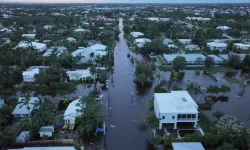The study, published in Science Advances, utilized advanced computing systems to detect a collapse warning for these currents.
As the planet warms, there are indications that the AMOC is heading in this direction, with potential consequences for sea level rise and global weather patterns.
The AMOC, including the Gulf Stream, acts as a global conveyor belt, influencing climate in the Northern Hemisphere. The collapse could lead to drastic temperature changes in Europe, disruptions in the Amazon ecosystem, and a potential sea level rise of around 1 meter.
While the study doesn't provide specific timeframes, it suggests that the planet is heading towards a tipping point under climate change, emphasizing the need for further research and attention to the risk of AMOC collapse.
“(It) adds significantly to the rising concern about an AMOC collapse in the not too distant future,” he said. “We will ignore this risk at our peril” said Stefan Rahmstorf, a physical oceanographer at Potsdam University in Germany, who was not involved with the study, said it was “a major advance in AMOC stability science.”






